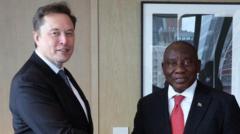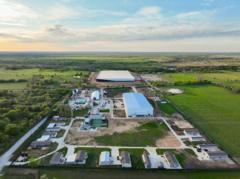South African President Cyril Ramaphosa has engaged in dialogue with Elon Musk to address criticisms from Donald Trump regarding a new land law that permits expropriation without compensation. This conversation aims to alleviate diplomatic tensions as Trump threatens to withdraw funding over allegations of land confiscation and discrimination.
South Africa's Ramaphosa Reaches Out to Musk Amid Trump’s Funding Threat Over Land Reform

South Africa's Ramaphosa Reaches Out to Musk Amid Trump’s Funding Threat Over Land Reform
In a bid to clarify South Africa's land reform policies, President Cyril Ramaphosa speaks with Elon Musk, addressing concerns raised by US President Donald Trump regarding potential funding cuts.
South African President Cyril Ramaphosa has initiated a conversation with tech billionaire Elon Musk in response to a controversy surrounding the country’s new land reform policies, which have attracted criticism from the United States. This came after President Donald Trump expressed intentions to cut future funding to South Africa, citing concerns over accusations of land confiscation and unequal treatment of certain groups.
Musk, who is a significant figure in Trump's circle, publicly questioned the motives behind Ramaphosa's land ownership laws, deemed by some to be "openly racist." In his call with Musk, President Ramaphosa emphasized the importance of rule of law and equality enshrined in South Africa’s constitution, aiming to clarify the intentions behind the recently passed law allowing expropriation without compensation in specific cases deemed "just and equitable."
This law was created amidst ongoing discussions regarding land reform, which remains a highly contentious issue in South Africa decades after the end of apartheid. The legacy of the 1913 Natives Land Act, which severely restricted property rights for the black majority while consolidating land ownership among the white minority, continues to be a focal point for many South Africans advocating for reform.
Trump's harsh perspective on the matter has further fueled tensions, leading him to label South Africa’s leadership as engaging in "terrible things." He posted on social media that funding would cease until a thorough investigation of the alleged land confiscation practices occurs.
The new law permits state intervention to seize land without compensation primarily in situations where the land is unused or poses dangers to safety, yet concerns have been raised regarding potential negative economic impacts reminiscent of Zimbabwe’s controversial land reforms that devastated its agricultural sector and economy.
Despite the ongoing public discourse, Ramaphosa has reiterated that there has been no illegal confiscation of land and emphasized the government's commitment to addressing historical injustices tied to land ownership. As South Africa navigates these complex issues, both domestic and international observers remain keenly interested in how the situation will unfold in the face of growing global scrutiny and the social implications of land reform.



















